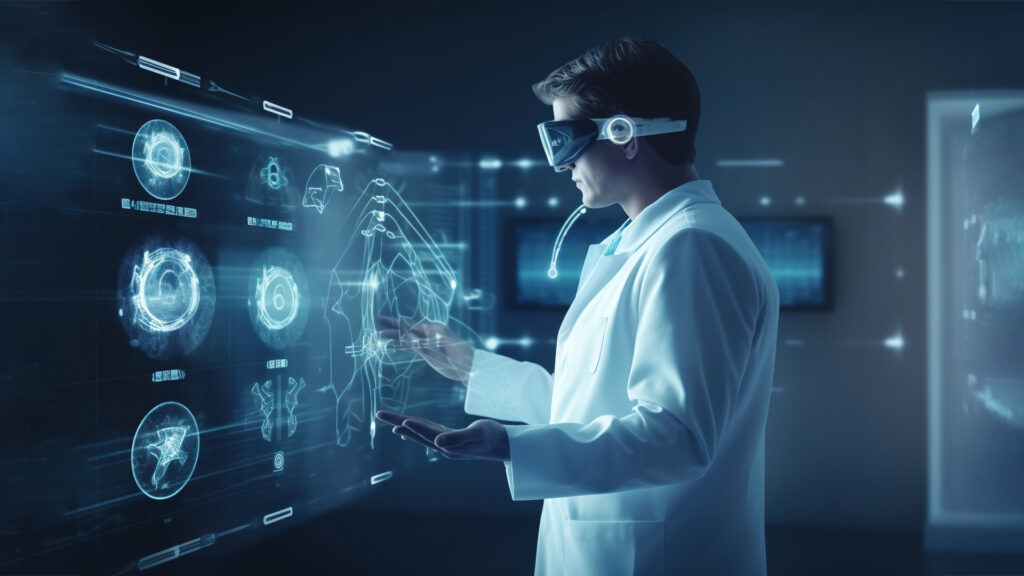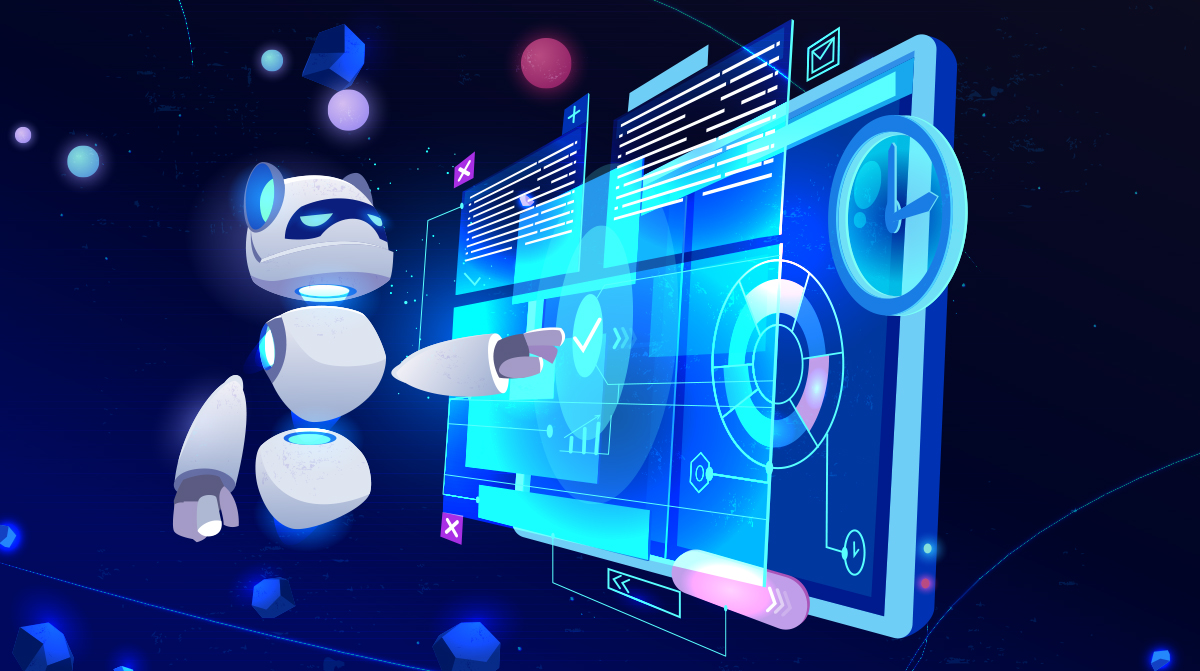This blog explores the potential of AI in healthcare, from research to diagnosis. It explores how AI is revolutionizing research methodologies and enhancing diagnostic precision. The blog explores how AI in healthcare research is reshaping medical advancements, accelerating breakthroughs, and improving patient outcomes. It highlights the convergence of innovation and compassion, unlocking the immense potential AI holds in shaping the future of healthcare research and diagnosis.
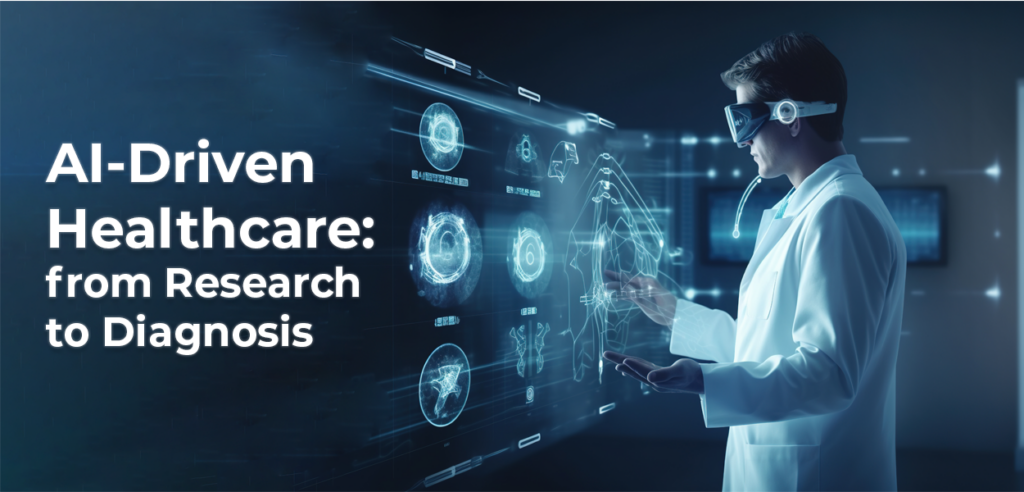
AI in Healthcare Research
Artificial intelligence (AI) is transforming several aspects of healthcare research, increasing efficiency and precision. Let’s look at how AI is making big advances in this industry.
Drug Discovery and Development:
- AI is reshaping the landscape of drug discovery by expediting the identification of potential compounds and predicting their efficacy.
- Through advanced algorithms, AI analyzes vast datasets, accelerating the identification of novel drug candidates and streamlining the development process.
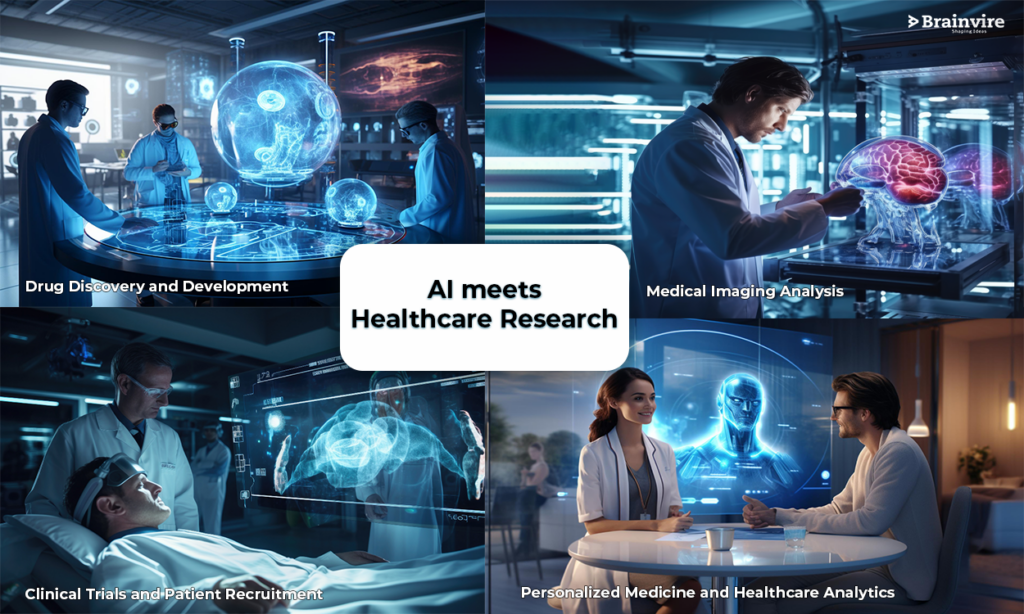
Clinical Trials and Patient Recruitment:
- Artificial Intelligence plays a pivotal role in optimizing clinical trials, enhancing efficiency, and reducing costs.
- By leveraging an AI medical diagnosis app, researchers can identify suitable candidates for trials, ensuring more targeted and diverse participant recruitment.
Medical Imaging Analysis:
- An AI powered medical diagnosis significantly enhances the precision and speed of medical imaging analysis.
- Through machine learning algorithms, AI aids in early detection of anomalies, facilitating prompt intervention and treatment.
Personalized Medicine and Healthcare Analytics:
- AI enables the customization of medical treatments through personalized medicine.
- Healthcare analytics, powered by AI diagnosis, provides insights into patient data, optimizing treatment plans based on individual characteristics.
AI is revolutionizing Healthcare diagnosis
In today’s rapidly changing healthcare environment, Artificial Intelligence (AI) is a transformative force, revolutionizing how we identify and treat illnesses. AI is making significant progress in providing efficient and tailored healthcare solutions, ranging from accelerating early diagnosis to streamlining workflows.
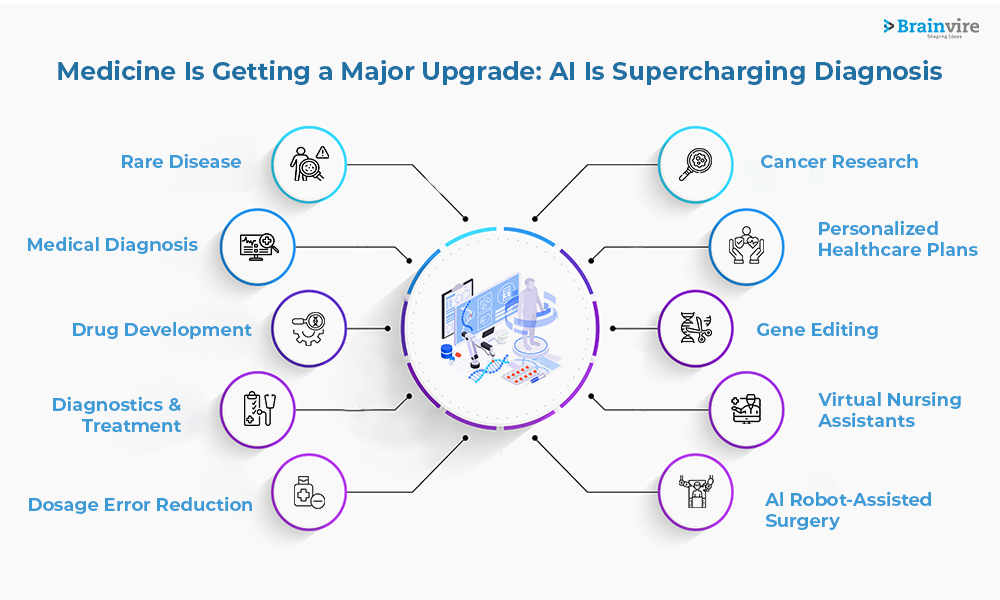
Supercharging Early Detection
AI Visionaries:
The goal of AI medical diagnosis is to empower visionaries to use cutting-edge technology to improve early disease detection. These visionaries are developing tools that can analyze large datasets using machine learning algorithms, recognizing subtle patterns that the human eye may miss.
Predicting Your Future:
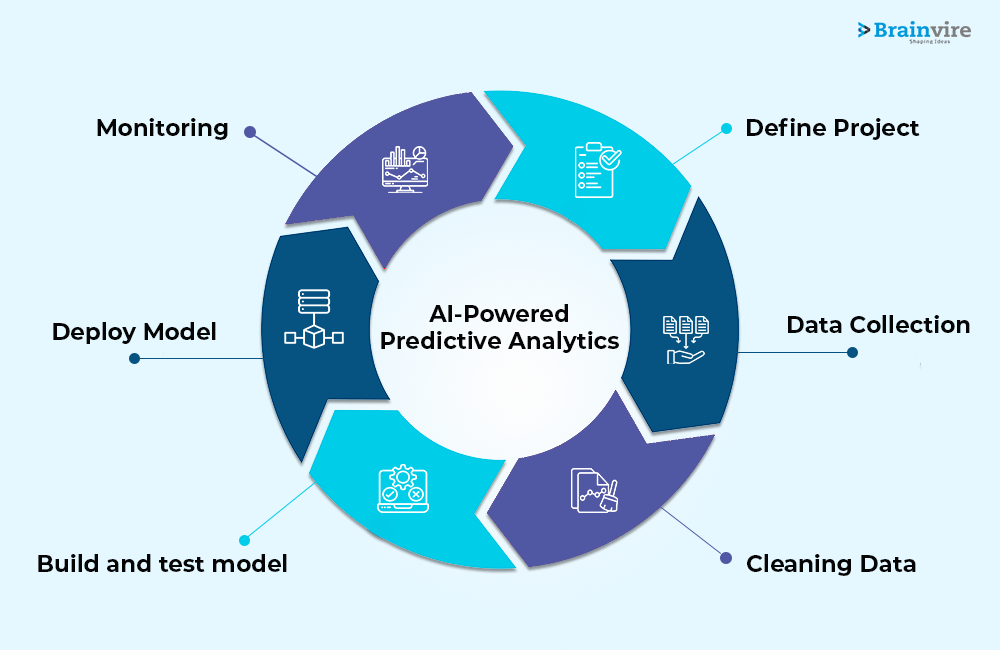
AI’s prowess in predictive analytics in healthcare is unlocking the ability to foresee health issues before symptoms manifest. By analyzing individual health records and lifestyle data, AI can predict potential risks, enabling proactive interventions for a healthier future.
Democratizing Diagnosis with Virtual Care
Doctor in Your Pocket:
AI’s integration into virtual care is putting a ‘doctor in your pocket.’ Mobile apps and virtual consultations powered by AI algorithms enable people to receive healthcare experience at any time and from any location. This democratic method to diagnosis is lowering barriers and providing more convenient healthcare options.
From the Doctor’s Office to Your Home:
Healthcare AI applications facilitate the transition from traditional doctor’s office visits to home-based diagnostics. AI-enabled home monitoring devices provide remote patient monitoring, ensuring timely intervention and reducing the need for frequent clinic visits.
AI as Your Diagnosis Partner
Decision Support Revolution:
Medical diagnosis AI has evolved into an essential ally for healthcare professionals, offering support through decision support systems. Through the analysis of patient data, AI delivers valuable insights, empowering clinicians to make more informed and timely decisions, thereby revolutionizing the diagnostic process.
Personalized Treatment, Tailored to You:
AI opportunities for healthcare professionals are mostly in the realm of personalized medicine. AI assists in designing treatment regimens that are tailored to each patient’s unique traits, increasing the chances of successful outcomes.
Precision Medicine Takes Flight
Cracking the Disease Code:
The combination of AI and machine learning in healthcare is unraveling disease complexity. AI systems analyze large data sets, uncovering genetic markers and patterns that contribute to a deeper understanding of diseases, potentially leading to breakthroughs in treatment.
Predicting Your Response:
AI’s predictive analytics in healthcare go beyond forecasting individual responses to treatments. AI can recommend the most effective treatment alternatives by assessing previous patient data, reducing trial and error and enhancing overall treatment success rates.
Streamlining and Supercharging Workflows
Freeing Up Time for What Matters:
Integrating AI into healthcare frees up valuable time for healthcare personnel. According to 79% of healthcare experts polled, robotics and AI will considerably assist the industry. Automated administrative activities and data analysis enable doctors to concentrate more on patient care, improving overall healthcare delivery efficiency.
Faster, More Accurate Diagnostics:
AI-powered diagnostic tools are far faster and more accurate than traditional methods. Rapid examination of medical imaging, pathology slides, and diagnostic tests accelerates the diagnosis process, ensuring timely interventions and better patient outcomes.
Building Trust with Transparency:
Ethical considerations in AI for medical diagnosis emphasize the necessity of transparency. AI systems must be designed with clear decision-making processes in place to ensure that healthcare professionals and patients understand and accept the recommendations provided by AI algorithms.
Seamless Integration is Key:
To overcome ethical challenges, seamless integration of precision medicine and AI into existing healthcare systems is critical. Adequate training and education for healthcare professionals ensures that human experience and AI skills work in tandem.

Human-AI Collaboration: A Powerful Duo
AI as a Partner, Not a Replacement:
AI’s position in health care is that of a collaborator rather than a replacement. While AI improves diagnosis, human judgment, empathy, and experience are still indispensable. A collaborative strategy ensures the best of both worlds by combining AI’s analytical power and human intuition.
Continuous Learning, Continuous Improvement:
The dynamic nature of health care necessitates ongoing learning. AI systems that are constantly updated and improved based on real-world data help to create an ever-changing diagnostic landscape that adapts to emerging health care challenges.
Investing in a Brighter Future
Fueling Innovation:
Investments in AI in healthcare market research and development fuel continuous innovation. Continued financial support for AI-driven solutions encourages the development of advanced tools, ensuring that the healthcare business remains at the forefront of technological advancement.
Sharing Knowledge, Sharing Success:
Collaborative efforts between researchers, fractional executive into healthcare organization, and technology experts enable knowledge exchange. The collective experience ensures that AI solutions for health care continue to evolve, benefiting from different perspectives and ideas.
Closing the Healthcare Gap
Equitable Access for All:
Healthcare data analytics using AI is critical in reducing access disparities by providing remote diagnostics and virtual care solutions. This ensures access to quality health care while also meeting the needs of persons in underserved communities with timely interventions.
Affordable Solutions for a Healthy World:
Affordable AI-driven healthcare solutions have the potential to lower overall healthcare costs. The goal, as technology improves, is to develop cost-effective AI solutions that can be deployed globally, creating a healthier environment for everyone.
Shaping the Future of Healthcare Delivery
From Reactive to Proactive:
Artificial intelligence for diagnosis is altering healthcare by shifting from a reactive to a proactive approach. Predictive analytics and early detection empower healthcare providers to address issues before they escalate, resulting in more effective and cost-effective interventions.
Evolving Policies for an Evolving Landscape:
As digital health and AI alter healthcare, the corresponding policy framework must evolve. Essential regulations and guidelines addressing the ethical use of AI, data protection, and practice standardization are critical for ensuring the responsible integration of AI into health-care systems.
Never-ending Innovation
AI, Always Learning:
In the realm of AI medical diagnosis online, the ongoing progress is driven by a dedication to perpetual learning. AI systems are crafted to adjust to novel data, emerging medical insights, and technological advancements, ensuring a pioneering role in healthcare innovation. The constant evolution in the field of AI medical diagnosis online reflects a commitment to staying abreast of new information and technological developments, solidifying its prominent position in healthcare innovation.
Welcoming Change, Embracing Progress:
The integration of artificial intelligence (AI) in healthcare is a transformative journey, fostering innovation and improving diagnostic precision. Embracing change is crucial for a dynamic and patient-centered future. Stakeholders must adapt to evolving technologies to create a healthcare landscape that is responsive to change and capable of delivering personalized, effective care. This journey is essential for shaping a progressive and patient-centric future in healthcare.
Read this also: Role Of Generative AI In Shaping The Future Of Healthcare Industry

Pioneers in AI for Healthcare Diagnostics
Artificial intelligence has emerged as a game changer in the ever-changing landscape of healthcare, notably in the realm of medical diagnostics.
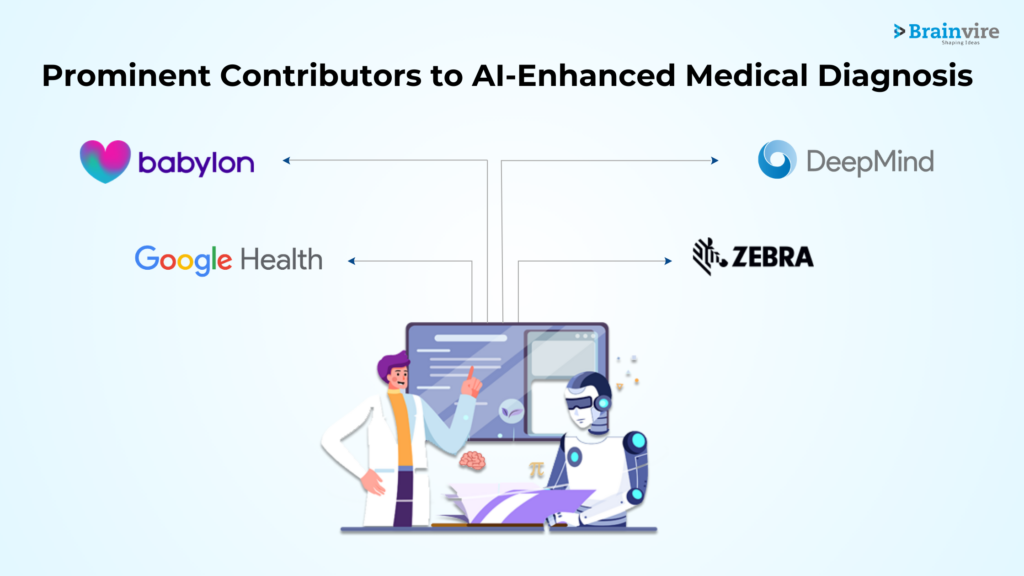
Several companies stand out as visionaries, leading the charge in integrating AI into health-care practice. Let’s delve into the contributions of key players as they work to define the future of AI-enabled medical diagnosis.
DeepMind Health: Pushing the Boundaries of AI in Medicine
- Overview: DeepMind Health, a subsidiary of Alphabet Inc. (Google’s parent company), has been in the forefront of leveraging AI for medical advancements. DeepMind has demonstrated the potential of AI in identifying eye diseases through innovative projects such as collaboration with Moorfields Eye Hospital. Their AI systems analyze complex medical images to provide quick and accurate diagnoses. This is a big step forward in the future of AI in healthcare, particularly in the realm of AI-enabled medical diagnostics.
- Impact: DeepMind Health’s initiatives have the potential to greatly enhance the speed and accuracy of medical diagnoses, allowing healthcare professionals to make more informed decisions.
Zebra Medical Vision: Revolutionizing Radiology with AI
- Overview: Zebra Medical Vision is another industry pioneer that focuses on harnessing the power of AI for diagnostic imaging. Their AI systems scan through massive medical image datasets, detecting anomalies and potential health issues. This strategy not only expedites the diagnostic process, but it also improves result accuracy. Zebra Medical Vision’s commitment to pushing the boundaries of AI in healthcare exemplifies emerging trends in healthcare AI.
- Impact: By automating and supplementing medical imaging analysis, Zebra Medical Vision promotes faster and more precise diagnosis, ultimately improving patient outcomes.
Babylon Health provides AI-powered health care to everyone
- Overview: Babylon Health is making waves by leveraging artificial intelligence to democratize healthcare access. Babylon Health empowers individuals to assess their health problems remotely using AI-powered chatbots and virtual consultations. AI functions as a bridge, connecting patients to healthcare resources in a timely manner. This demonstrates the transformative role of artificial intelligence devices for medical diagnostics, making healthcare more accessible to a larger population.
- Impact: Babylon Health’s AI-powered strategy broadens access to healthcare services, particularly for people living in remote or underserved areas, assisting in the early detection and management of health issues.
IBM Watson Health: Transforming Healthcare with Cognitive Computing
- Overview: IBM Watson Health is a pioneering force in healthcare, utilizing cognitive computing to transform the industry. With its roots in artificial intelligence, IBM Watson Health analyzes vast datasets to offer valuable insights for health professionals.
- Impact of IBM Watson Health
- Precision Medicine Advancements: IBM Watson Health has propelled precision medicine, tailoring treatments based on individual patient data. This personalized approach enhances treatment efficacy.
- Accelerated Drug Discovery: The platform expedites drug discovery processes by sifting through extensive medical literature and data, potentially leading to breakthroughs in pharmaceutical research.
- Optimized Diagnostics: Cognitive computing aids in diagnostics, improving accuracy and enabling early detection of diseases.
Google Health: Integrating AI for Predictive Healthcare
- Overview: Google Health, a pioneering force in healthcare, utilizes advanced technologies to reshape the industry. As a subsidiary of Alphabet Inc., Google Health integrates artificial intelligence and data analytics to provide innovative solutions for patients and healthcare professionals.
- Impact of Google Health
- Predictive Healthcare: Google Health’s AI-driven tools analyze patient data to predict and prevent potential health risks, fostering a shift towards proactive healthcare.
- Medical Imaging Advancements: The company’s AI applications enhance medical imaging analysis, facilitating early detection of diseases like cancer and improving diagnostic accuracy.
- Data-Driven Recommendations: Leveraging machine learning, Google Health offers personalized recommendations, empowering individuals to make informed decisions about their health.
The Collective Impact: Shaping the Future
- Together, these forward-thinking companies are at the forefront of revolutionizing AI-enabled medical diagnostics.
- They are driving the evolution of more efficient, accurate, and accessible health-care solutions by leveraging the capabilities of artificial intelligence.
- These breakthroughs represent not only technological achievements but also critical tools for improving the quality and reach of health-care services.
- Navigating the landscape of emerging trends in healthcare AI, it’s clear that these firms are playing a critical role in revolutionizing the industry.
- Their commitment to utilizing AI in diagnostics represents a big step forward in providing cutting-edge and impactful solutions for improved patient outcomes.
Conclusion
Artificially intelligent technology is reshaping the healthcare industry by changing the research-to-diagnose process. The AI market in the healthcare business is expected to grow to $187.95 billion by 2030. The use of advanced technology and medical science opens up new avenues for efficiency and precision. AI’s impact on medical diagnosis is particularly substantial, reshaping healthcare challenges. The synergy between AI and medical diagnosis has the potential to improve patient outcomes and streamline processes, opening the path for a paradigm change that benefits healthcare professionals and patients worldwide.
Read more: Exploring Generative AI’s Revolutionary Impact In Automotive Industry
FAQs
Health-care professionals must undergo AI training to improve their digital skills. Infrastructure should incorporate AI systems while emphasizing interoperability. Continuous education and collaboration between the IT and healthcare sectors can help to optimize AI adoption for better patient care.
Biased algorithms, concerns about data privacy, and potential job displacement are among the risks. Responsible AI development necessitates strong regulations, transparent algorithms, ethical data use, and continual oversight. Balancing innovation and ethical considerations is critical for responsible AI in healthcare market research.
AI has enormous potential in drug discovery, accelerating the identification of promising molecules. AI improves surgical precision and efficiency. Aside from that, AI assists with predictive analytics, personalized medicine, and disease monitoring, revolutionizing health care in a variety of sectors.
AI-enabled wearables and devices are crucial in preventative healthcare. They monitors vital signs, detect anomalies, and provide real-time data for remotely monitoring patients. Proactive data-driven interventions can prevent health problems and improve overall well-being.
AI aids medical practitioners in diagnosing diseases by processing large data sets quickly and accurately. Human experience remains necessary for contextual understanding, empathy, and complex decision-making. A positive relationship between AI and human professionals ensures comprehensive and concise health-care delivery.
AI examines patient data and tailors treatment recommendations based on genetic, lifestyle, and environmental variables. This personalized approach deviates from traditional one-size-fits-all methodologies. AI-powered precision medicine improves patient care by optimizing outcomes while minimizing side effects and increasing overall treatment efficacy.
AI enhances medical imaging analysis by detecting irregularities, identifying structures, and predicting illness outcomes. It uses machine learning algorithms to quickly evaluate images, aiding in early-stage disease identification. This early detection saves lives and improves treatment outcomes. AI can also enhance medical tests, analyze patient risk factors, and reduce clinician workload.
Related Articles
-
Best Free AI Presentation Maker Tools for 2025
In the digital age, crafting visually appealing presentations has become necessary for businesses, educators, and students. AI presentation maker tools simplify this process, enabling users to create professional-quality slides with
-
Unlock Your Podcasting Potential: Top AI Tools Every Podcaster Needs in 2025
Introduction The podcasting landscape is evolving, and AI tools are now essential for podcasters looking to enhance their content, streamline production, and grow their audience. Whether it’s improving sound quality,
-
Top 20 AI Product Description Generator Tools To Use in 2025
Introduction Artificial Intelligence (AI) is revolutionizing businesses’ operations and transforming processes across industries. Among its most impactful applications are AI Product Description Generator tools, which are reshaping how companies handle

